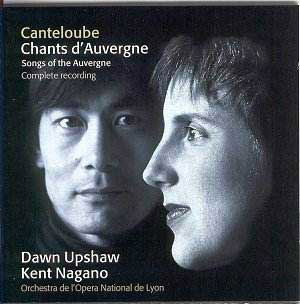Dawn Upshaw's voice has that innocent wondering vulnerability
all too little known amongst the knowing and blowsy ranks of the majority
of operatic divas. Upshaw's approach is a shade more mature than Davrath
(my first recommendation - on Vanguard - despite its saturated sound colours).
She has an alto accentuation and a darker tincture than Davrath's demoiselle
tone. This is well illustrated by a comparison of Upshaw and Davrath in
L'Aïo dè rotso in which Upshaw’s warm lower register
has the benefit of outstanding orchestral playing. Superb shepherd fifing
from the Lyon woodwind principals - seething with eccentric character.
The same qualities light up the playing in Ound'onouren Gorda? and
the various Bourrées. There is some astoundingly sensitive
clarinet playing in N'aï pas iéu de mio.
I have not compared times but Upshaw leans towards
very slow tempi in the andante songs (of which there are many).
The classic Baïlèro is sweetly handled. The effect
is enhanced by Upshaw's voice switching from left to right channel to
mimic the bergère hillside dialogue patent in the sung
words.
Upshaw can still show a pretty pair of heels for example
in Chut Chut where the smile in her voice is unmistakable as
also in superb Hé Beyla-z-y dau fé with its spirited
donkey bray and real kick. The summer ooze rather moderates the effect
in the dog-calls of Tè l'Co tè and in the sprightly
Obal dins lou Limouzi (superbly rustic drum sounds here) but
she serves us well in Brezairola and Per l'èfon -
both lullabies. Davrath however manages the fonder ardent smile of the
child mother.
Nagano's orchestra is presented in a more spread soundstage
unlike the irresistibly unnatural close-up adopted by Vanguard for Davrath.
The sound is clear and unassertive; prepossessing but without the high
candle power of the Davrath Vanguard set.
When will we get all the other regional sets, I wonder.
Bayo and Leroux gave us the Basque Songs (Naïve and Gallo) but
there are shelves full of his other arrangements!
The Emmanuel has competition on Marco Polo but unfortunately
I have not heard that version. Unlike the Canteloube set, all but one
of which are sung in Auvergnat dialect, these are sung in French. These
are songs of dance and drolerie, field and village green. They are somewhat
in the pastoral vein of the Canteloube but if the Auvergne songs are
touched with a Delian wand these evince what might easily be the influence
of Vaughan Williams. In fact I thought often of various songs from Sir
John in Love. The highlight is the last song Adieu Bergère.
I commend this set very strongly to those who would
like both a splendid modern recording of the Canteloube songs and a
chance to widen horizons with the Emmanuel.
This is a good set, very well recorded and with the
merit of Dawn Upshaw's voice a central attraction. Will be preferred
by those who like a leisurely Delian approach to their Canteloube songs.
Rob Barnett


